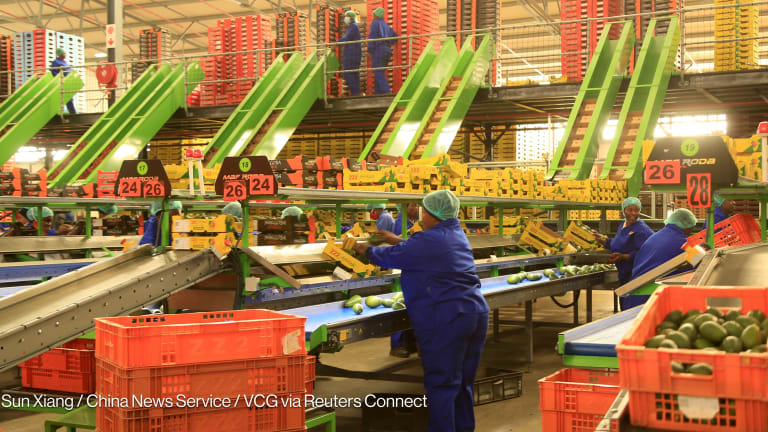
This week the Alliance for a Green Revolution in Africa, or AGRA, launched its annual report on the state of agriculture on the continent. The report focused on the ways to accelerate food systems transformation on the continent and identified megatrends currently shaping the development of agrifood systems.
Ed Mabaya, a research professor at Cornell University and one of the authors of the report said the 2022 Africa Agriculture Status Report aims to capture broad categories causing these megatrends and how such trends should influence the way investments and policy and regulatory decisions are made.
Get the inside track on how agriculture, nutrition, sustainability, and more are intersecting to remake the global food system in this weekly newsletter.
“Often people who work in that policy space are not changing the documents fast enough to keep up,” he said. “Most governments have 10-year frameworks, five-year frameworks, we really want these to be seen as live documents that have to be flexible and nimble enough to adjust to these things that are going on now.”
The report urged African governments and development partners to anticipate and proactively respond to six major demographic, economic, environmental, and social megatrends.
1. Rural population growth and rising land scarcity
The African population is growing rapidly. Between 2017 and 2050 sub-Saharan Africa’s rural population is expected to rise by 53%. In addition, the continent also has a growing class of middle- to high-income urban-based Africans who are interested in commercial farming. According to the report, these two factors will lead to an increased demand for agricultural land and land scarcity, which will in turn drive up land values. Pressure on agricultural land will also lead to a decline in the size of most smallholder farms and an increase in continuous cultivation leading to land degradation.
2. Rising urban populations and increasing demand for food
As Africa’s urban population and their incomes grow, it will drive an “explosive growth in food demand.” If the continent fails to increase yields in accordance, it may be forced to convert its remaining forests and natural grasslands into farmland — with associated high costs to the continent’s environment — or become much more dependent on the imports for its food supplies.
3. Economic transformation
The report states that economic development, including rising incomes, will create both challenges and opportunities for African food systems. The growing middle class will lead to a rapid shift in the labor force from farming to “non-farm” jobs, which may encourage the move to labor-saving farm technologies and practices. Rising wages will also trigger changes in diets leading to increased demand for meat, fish, processed foods, cooking oil, and foods prepared away from home. This should fuel private investment and growth in the cereal and oilseed sectors as well as the processing industry and human nutrition in general.
4. Climate change and extreme weather events
According to the Intergovernmental Panel on Climate Change, the African continent will most likely experience more rapid rates of increases in surface temperature than other regions of the world. In addition, the continent will also likely experience a heightened frequency and intensity of extreme rainfall events including droughts, heavy rains, and floods.
According to the report, such events combined with chronically low public expenditure on agricultural research, development, and extension — or RD&E — systems are already slowing the pace of farm technical innovation and agricultural productivity growth on the continent. This may drive agrarian expansion into natural areas resulting in the loss of habitat and ecosystem services. Climate change is also believed to be fueling conflicts for ever scarcer productive land, water, and pasture.
5. Global health crises, civil conflict, and economic disruptions
Rapid globalization, especially over the past four decades, has increased African countries’ vulnerability to regional as well as global shocks. The COVID-19 pandemic and the war in Ukraine have highlighted the risks associated with Africa’s reliance on global supply chains for agricultural commodities such as wheat, corn, and cooking oil to meet the population’s needs.
6. Accelerated pace of technical innovation in digital agriculture
While the pace of technical innovation across the agrifood value chain is lower in Africa compared to other regions, the report noted that the rapid adoption of mobile phones and internet connectivity has accelerated the deployment of agricultural services for farmers. But the continent can only achieve the full potential of a digital agricultural revolution through increased investment in communications infrastructure in rural areas, it notes.
Recommendations
The Pro read:
Oxfam pivots to tackle the food crisis in Africa
Oxfam GB is hiring more staff and shifting its programs in the Horn, East and Central Africa region to respond to the food crisis and its consequences, including rising gender-based violence, says regional director Parvin Ngala.
The report recommended promoting education to enable rural youth to pursue non-agricultural careers and improving agricultural RD&E systems to improve productivity on existing agricultural land. It also called for increased funding for such systems to help smallholder farmers expand their productivity and use of innovative technology.
Policymakers were also implored to put the development of a more resilient and sustainable food system on the front burner “prioritizing investments in local wet markets and opening new trade corridors that are connected to major sources of raw materials.”
The report estimates that governments would need to invest between $40 billion and $77 billion a year, with up to $180 billion in private sector funding, to trigger and sustain agrifood transformation on the continent.
Mabaya said though these numbers look big, the returns on these investments would be even greater and called for increased urgency to meet the continent’s goals.









